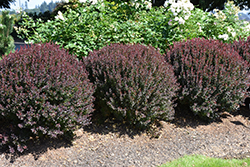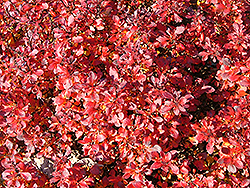It's all about ...
plants

Pygmy Ruby Barberry
Berberis thunbergii 'Pygruzam'
Height: 15 inches
Spread: 3 feet
Sunlight:
![]()
Hardiness Zone: 4a
Description:
A naturally dense globe shaped dwarf variety displaying deep red foliage; flowers are inconspicuous; needs regular watering
Ornamental Features
Pygmy Ruby Barberry has attractive dark red deciduous foliage on a plant with a round habit of growth. The small glossy oval leaves are highly ornamental and turn an outstanding red in the fall.
Landscape Attributes
Pygmy Ruby Barberry is a dense multi-stemmed deciduous shrub with a more or less rounded form. Its relatively fine texture sets it apart from other landscape plants with less refined foliage.
This is a relatively low maintenance shrub, and can be pruned at anytime. Deer don't particularly care for this plant and will usually leave it alone in favor of tastier treats. Gardeners should be aware of the following characteristic(s) that may warrant special consideration;
- Spiny
Pygmy Ruby Barberry is recommended for the following landscape applications;
- Mass Planting
- General Garden Use
- Container Planting
Planting & Growing
Pygmy Ruby Barberry will grow to be about 15 inches tall at maturity, with a spread of 3 feet. It tends to fill out right to the ground and therefore doesn't necessarily require facer plants in front. It grows at a medium rate, and under ideal conditions can be expected to live for approximately 20 years.
This shrub should only be grown in full sunlight. It does best in average to evenly moist conditions, but will not tolerate standing water. It is not particular as to soil type or pH. It is highly tolerant of urban pollution and will even thrive in inner city environments. This is a selected variety of a species not originally from North America.
Pygmy Ruby Barberry makes a fine choice for the outdoor landscape, but it is also well-suited for use in outdoor pots and containers. It is often used as a 'filler' in the 'spiller-thriller-filler' container combination, providing a canvas of foliage against which the thriller plants stand out. Note that when grown in a container, it may not perform exactly as indicated on the tag - this is to be expected. Also note that when growing plants in outdoor containers and baskets, they may require more frequent waterings than they would in the yard or garden. Be aware that in our climate, most plants cannot be expected to survive the winter if left in containers outdoors, and this plant is no exception. Contact our experts for more information on how to protect it over the winter months.
This plant is not reliably hardy in our region, and certain restrictions may apply; contact the store for more information.

